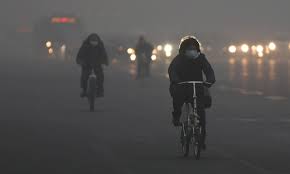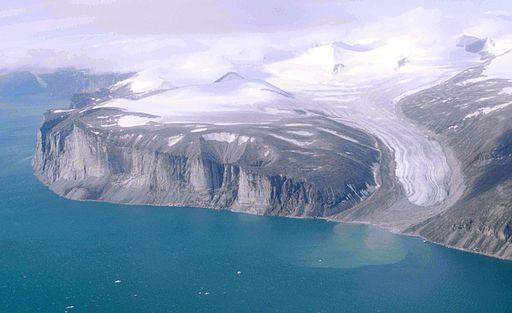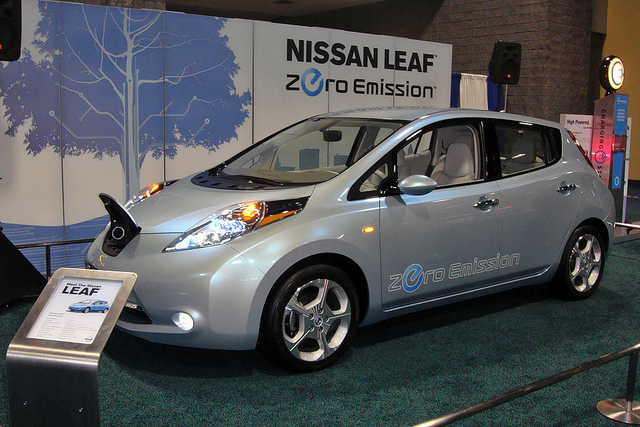
Almost everyone now recognizes the burning of dirty coal and oil globally is altering our planet’s atmosphere and climate, melting ice caps, acidifying oceans, and edging us closer to a day when we can no longer take clean water, fertile soil, or abundant chemical and pesticide-free food for granted.
If you do still doubt, just look at the photo below of Beijing’s opaque, sooty air, the result of China’s long-term burning of coal for industrial fuel and its relatively new explosion in car manufacturing and sales.

That air is black!
Furthermore, it is clear from record-keeping that began in the 19th century that humans have been remaking the planet, making it less green, and are now suffering the consequences.
Over the last two decades alone carbon dioxide emissions have increased 60 percent; human population has increased by 1.7 billion; sea levels have risen three inches; extreme weather has increased 30 percent, ice sheets on Greenland and in Antarctica have decreased by 4.9 trillion tons of ice—and just in the last nine months ocean temperature has risen.

Looking more deeply, it is evident that extracting oil, gas, and coal is a non-reciprocal, dominance-based relationship with earth—one purely of taking. Extracting is the mentality of the mountain top remover and the old-growth clear cutter, because it is blind to living complex ecosystems and only sees the singular “resource” to be mined, cut, fished, etc.
Extracting is the opposite of stewardship, which does involves taking, but taking with care that regeneration and future life continues.
The good news is that as awareness spreads, leaders, innovators, and grassroots movements are saying “No” to fossilized thinking. For example, the US Senate could not override President Obama’s Keystone veto.
That was a powerful, as well as a symbolic, “No.”
The University of British Columbia has just developed a recycler into which one can feed plastic water bottles and other plastics into its 3D printers, which can then make inexpensive artificial limbs for children and adults. This is a brilliant, beneficial invention that utilizes reusing and recycling.
Not only has the Nissan Leaf become the best-selling electric car worldwide, but owners of the plug-in electric mid-sized sedan have driven 1 billion kilometers worldwide, saving more than 180 million kilograms of CO2 emissions. In the Netherlands Nissan has driven its first glow-in-the-dark electric Leaf sedan on the world’s first luminous “smart” highway—a solar powered highway—showcasing how many of its customers are powering their cars from solar energy.
GreenHotel-World.com helps earth-friendly travelers minimize their travel impact on the environment by listing only green-certified hotels that also sustain local communities. The site features a rating system so that folks can know just how green each hotel is, and it compensates for the carbon emissions of each stay by donating to MyClimate.
In short, let’s keep fossil fuels in the ground!
Green federal government legislation action would be helpful to do this, but innovative people, and citizens of cities, states and provinces are doing much to turn the tide to clean and green. For example, New York banned fracking in December 2014, and Alberta, infamous for its tar sands, just banned fracking this month, April 2015 because it was causing faults and earthquakes.
Renewable energy systems create green jobs and are more reliable than power based on fossil fuel extraction, which requires new imputs to avoid crashes. But the sun and wind and tides are comparably inexhaustible and free, once harnessed with minimum maintenance. Small-scale solar power, especially rooftop solar, is becoming increasingly popular. And there is growing interest in consumer-owned clean power, which is further jump-starting the solar market.
Cities are beginning to realize that spending five billion dollars on public transit and renewable energy provides at least three times more jobs in the short term than the same short term work on pipelines, while helping reduce climate change in the long term.
Climate action is the best hope for a better present and future for the majority of people. In many ways it would create a more genuine democracy in Canada and the United States and would shake up the fossil fuel based corporate-ocracy that dominates both countries’ politics by being more inclusive and respectful of human rights and dignity for all people.
Relephant:
The Embarrassingly Simple Solution to Climate Change.
Adapting a Climate Change-Friendly Lifestyle: 4 Simple Steps.
Can Climate Science Still Be Ignored?
Author: Linda Lewis
Editor: Renée Picard
Images: Richard Potts at Flickr / Wiki Commons / mariordo59 at Flickr












Read 5 comments and reply